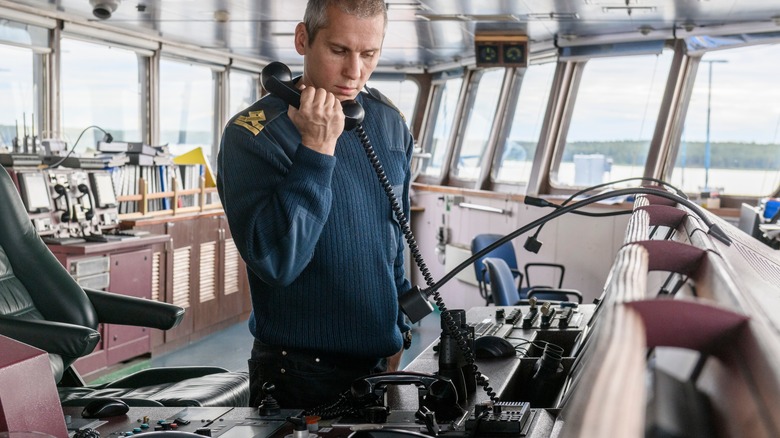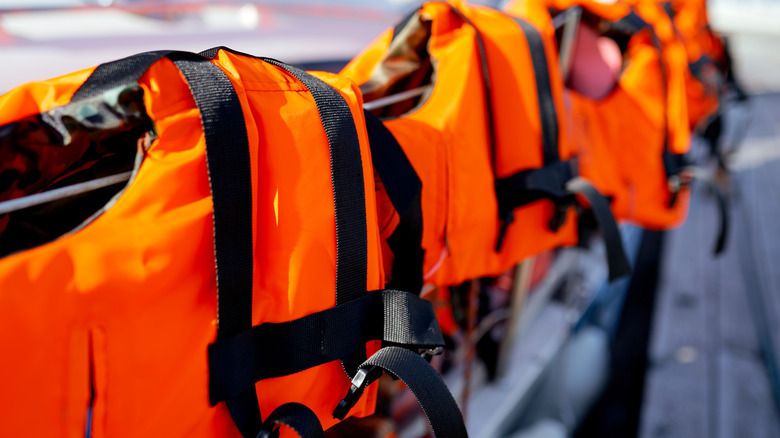Cruise Ship Code Words To Keep Your Ears Open For
In most cases, cruising should be all about relaxation and adventure. Whether you're booking a cruise line for your next family vacation or embarking on a journey that'll take you along some of the best sights in northern Europe, a cruise vacation typically means enjoying the best of both worlds in terms of comfort and exploration under one roof.
However, in between all of the excitement that comes with cruising, there are certain moments aboard that might leave you feeling a little confused or lost. This is especially common when it comes to understanding what cruise staff are saying to each other — or, better yet, how they're saying it. Enter: cruise-specific code words.
From head-scratching terms like "PVI" (public vomiting incident) to the more ominous Code Red (which signifies there's a potential contagious disease outbreak, like norovirus, onboard) and Code Oscar (which indicates the terrifying situation that a passenger has fallen overboard), cruise code words come in many forms, purposes, and levels of urgency. Nonetheless, there are a few of them out there that, ideally, you'll never want to hear. Here are some emergency and non-emergency code words to keep an ear out for on your next cruise.
Cruise code words for emergencies
Although certain cruise lines have their own specific code words, many have general meanings across all companies. Code Alpha is the staff's way of communicating that there's currently a medical emergency onboard. Once the cruise crew has been notified, the ship's first response team will spring into action to take care of whatever might be happening. And while this doesn't necessarily affect other passengers directly, it's best to try and stay away from wherever the emergency was reported so you're not inadvertently obstructing anyone from doing their job.
Along with Code Alpha, there are other cruise codes out there that also signify there's an emergency on board. For example, Code Blue is another term used to denote there's a medical emergency, and is oftentimes used in conjunction with codes like Alpha so that the crew can quickly assess the severity of the situation. From there, Code Black is usually reserved for more severe emergencies — some of which might involve casualties — happening onboard. Lastly, there's also Code Pink — the staff's way of alerting to a pediatric emergency that requires immediate support.
Away from medical emergencies, there are other codes you'll want to keep your ears peeled for. Some of these include: Code Bravo, which translates to a fire onboard; Code Kilo, which might hint that there'll be an evacuation; Code Echo, meaning that the ship is starting to drift; Code Purple, which refers to a potential bomb threat on the cruise; and Operation Rising Star, which means someone has died aboard the ship.
Cruise code words that are no reason to panic
Luckily, not all cruise codes necessarily mean the worst has happened. In some cases, ships will use a sort of "traffic light system" when designating codes. With that in mind, hearing something like Code Yellow — used to denote there's a sanitation issue — or Code Green — which is used to alert everyone the emergency has been dealt with — shouldn't be cause for concern.
So, why use code words at all? According to a piece on Bloomberg by former Royal Caribbean International temporary director Brandon Presser, codes are essential for cruise staff to communicate with one another without sending passengers into a full-blown meltdown if there actually happens to be something wrong. That way, the crew can deal with the situation without guests asking questions or running amok, unnecessarily concerned for their own safety.
Plus, in most cases, the crew and staff will be more than adequately trained to assess and deal with the emergency at hand, meaning there's realistically nothing you can do to help, intervene, or even worry about. All in all, it's best to just stay calm and alert in case of any developments that might involve passenger cooperation — and stay clear of the designated emergency zones.


